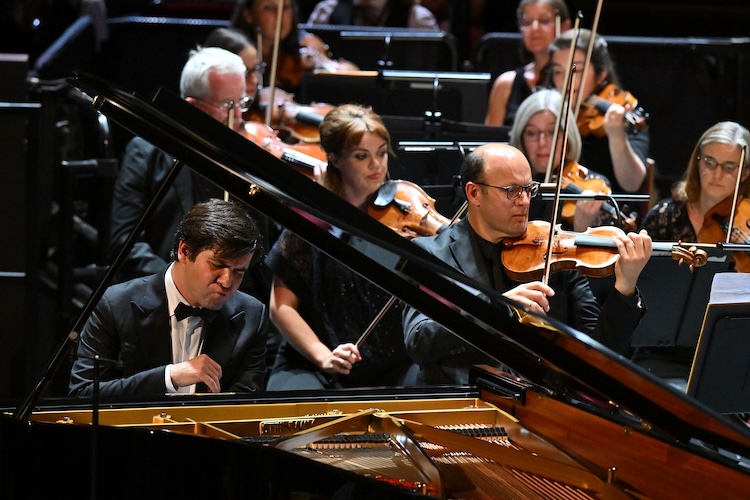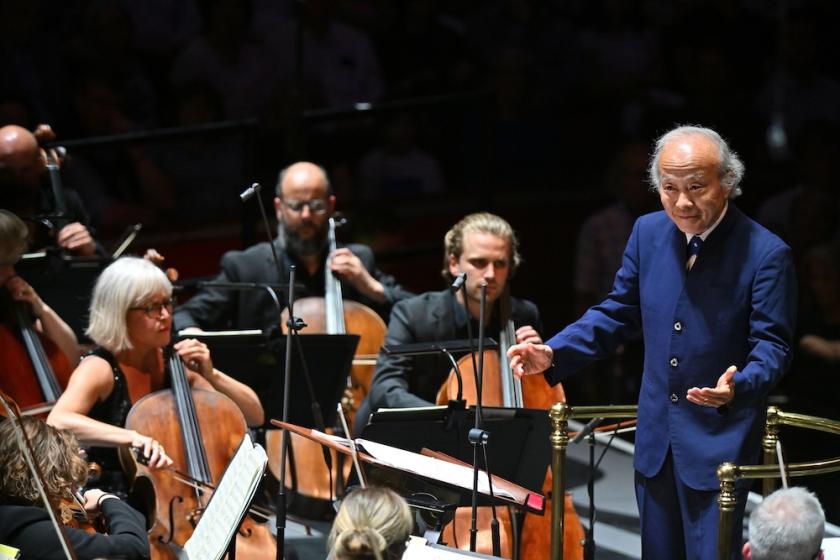According to the programme, Lutosławski’s Concerto for Orchestra is heard somewhere around the world every other week. In which case I’ve been unlucky in never having heard it live before, despite being a fan for nearly 30 years. So I was relieved that last night’s Prom’s outing – in Tadaaki Otaka’s farewell with the BBC National Orchestra of Wales, after a 40 year collaboration – didn’t disappoint.
The playing was urgent, colourful and glorious - everything I could have wanted. Completed in 1945, the Concerto is a direct descendant of Bartók’s, and this came over loud and clear in the brass chorales of the last movement, and the emphasis on pairs of wind instruments throughout. But the scrunches are scrunchier (the low brass were fabulous), the taut menace edgier, and the filmic gleam of the orchestral writing somehow of a modern age, even though written less than a decade after the Bartók. The second movement had the tightest of xylophone and piccolo duets – really exposed but flawless, a wonderful solo tuba spot for Matt Lait and a percussion section diminuendo to nothing that was perfectly judged by Otaka. The last movement carries the emotional weight, in its inexorably building passacaglia, and also provides the fun and games at the end, crunchy dissonances amid a dash for the line. It was terrific. Those who left at the interval – there were gaps in the second half where there were none in the first – did themselves no favours: this was the highlight of the concert.The other two pieces were also concertos, but from completely different traditions: a mid-century neoclassical concerto grosso and the biggest piano warhorse of them all. The opener was Grażyna Bacewicz’s Concerto for String Orchestra, her best-known piece, although that isn’t saying much. It was great, the violinist-composer writing really effectively for strings, whether in the scurrying outer movements redolent of Hindemith and Tippett, or in the more individual world of the central panel. This was by turns warm and cold, thanks to different types of bowing, the orchestration pared right down and the players responsive to Otaka’s batonless gestures.
The last movement carries the emotional weight, in its inexorably building passacaglia, and also provides the fun and games at the end, crunchy dissonances amid a dash for the line. It was terrific. Those who left at the interval – there were gaps in the second half where there were none in the first – did themselves no favours: this was the highlight of the concert.The other two pieces were also concertos, but from completely different traditions: a mid-century neoclassical concerto grosso and the biggest piano warhorse of them all. The opener was Grażyna Bacewicz’s Concerto for String Orchestra, her best-known piece, although that isn’t saying much. It was great, the violinist-composer writing really effectively for strings, whether in the scurrying outer movements redolent of Hindemith and Tippett, or in the more individual world of the central panel. This was by turns warm and cold, thanks to different types of bowing, the orchestration pared right down and the players responsive to Otaka’s batonless gestures.
I was bit more ambivalent about Vadym Kholodenko’s (pictured above by Mark Allan) take on Rachmaninov’s Second Piano Concerto. He is clearly a pianist of phenomenal technique, but I found his playing inward and not entirely suited to the huge expanse of the Albert Hall. The tempos of the outer movements were very deliberate, lacking forward momentum (a fine horn solo by Tim Thorpe notwithstanding), but I appreciated the no-nonsense playing in solo moments, no tortured rubato here. The middle movement was the best: I was reminded how wonderfully – and subtly – it is scored. Nicholas Carpenter’s clarinet initial presentation of the big tune duly melted my heart, and in this movement the intimate piano playing worked better. Elsewhere this archetype of heroic pianism needed more heroics: this maybe wasn’t the venue to try to reinvent it?













Add comment